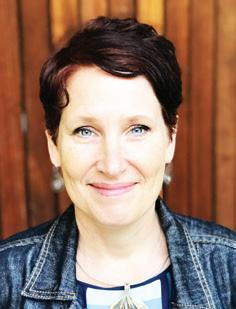




Did you make any New Year’s resolutions this year? According to a recent study, nearly 80 percent of people abandon their resolutions by February. No matter how good our intentions may be, we don’t always live up to our promises. Thankfully, God does.

The Bible tells us that “He who began a good work in you will carry it on to completion until the day of Christ Jesus” (Philippians 1:6).
What is that “good work”? We know that God is at work in our lives when we see the fruit of the Spirit. That’s love, joy and peace. Patience, kindness and goodness. Faithfulness, gentleness and self-control (see Galatians 5:22-23).
Learning to be more like Jesus—now there’s a resolution worth keeping.

To start the new year with Jesus, visit our website at faithandfriends.ca or contact us at The Salvation Army Editorial Department, 2 Overlea Blvd., Toronto ON M4H 1P4.
2023 I faithandfriends.ca



Freelance writer and sports buff Jayne Thurber-Smith looked forward to interviewing Survivor Season 42 winner Maryanne Oketch, but she also had a special reason for wanting to chat with her fellow Canadian.
“I was hoping she would help me with my fear of snakes,” Jayne sheepishly admits.
The interview went well. “Maryanne was very sweet and giggly and she was a lot of fun over the phone,” Jayne reports. “But my fear of snakes was very minor league to her; she’s way too tough for me to emulate. When Maryanne commented that the only thing that really bothered her was when they burned a log with maggots in it, I almost got sick just picturing it. I now know for certain I am not Survivor material!”
Jayne’s article is on page 16.
Elsewhere in this month’s Faith & Friends, you’ll discover why a little red Bible was the key to a lifetime of salvation for one young man, you’ll see how The Salvation Army is making a difference on the island of Jamaica and you’ll read about a hurricane that brought two people together in Hawaii.
Congratulations to Jan Keats, whose “Mary’s Memories,” originally published in the November 2021 Faith & Friends , recently won The Word Guild’s award in the Profile/Human Interest & Short Feature category. The Word Guild comprises writers, editors, speakers, publishers, booksellers, librarians and other Christian individuals who are united in their passion for the written word.
Ken RamsteadTo show Christ at work in the lives of real people, and to provide spiritual resources for those who are new to the Christian faith.
Faith & Friends is published bimonthly by: The Salvation Army 2 Overlea Blvd, Toronto Ontario, M4H 1P4
International Headquarters 101 Queen Victoria Street, London, EC4P 4EP, England
Brian Peddle, GENERAL
Commissioner Floyd Tidd
TERRITORIAL COMMANDER
Lt-Colonel John P. Murray SECRETARY FOR COMMUNICATIONS
Geoff Moulton, DIRECTOR OF INTERNAL COMMUNICATIONS, EDITOR-IN-CHIEF AND LITERARY SECRETARY
Pamela Richardson ASSISTANT EDITOR-IN-CHIEF
Ken Ramstead, EDITOR
Kristin Ostensen
MANAGING EDITOR OF SALVATIONIST AND SALVATIONIST.CA
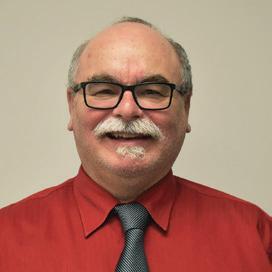
Lisa Suroso GRAPHIC DESIGN SPECIALIST
Rivonny Luchas
DIGITAL MEDIA SPECIALIST
Ada Leung CIRCULATION CO-ORDINATOR
Giselle Randall, Abbigail Oliver
STAFF WRITERS
Scripture Unless otherwise indicated, all Scripture references are taken from New International Version
Contact Us P. (416) 467-3188, F. (416) 422-6217
Websites faithandfriends.ca, salvationist.ca, salvationarmy.ca
Email faithandfriends@salvationarmy.ca
Subscription for one year: Canada $17 (includes GST/HST); U.S. $22; foreign $24 P. (416) 422-6119
circulation@ salvationarmy.ca
All articles are copyright The Salvation Army Canada & Bermuda and cannot be reproduced without permission.
Publications Mail Agreement No. 40064794
ISSN 1702-0131
1992’s Hurricane Iniki is a reminder to two Salvation Army pastors that love conquers all.
by Jayne Thurber-SmithFinding Love in the Midst of Tragedy Majors Debbie and Phil Lum today. “There’s a silver lining to everything,” says Major Phil
In September 2022, a year after the 20th anniversary of 9/11 was commemorated, Hawaiians marked the 30th anniversary of Hurricane Iniki, the most destructive hurricane to strike the island in recorded history. The southside of Kauai, Hawaii’s northernmost island, became their ground zero.
The Category 4 storm was supposed to pass south of Kauai but turned north. Though the majority of residents were unprepared for Iniki to make landfall when and where it did, The Salvation Army was ready to serve when the storm hit.

Jurassic Park to the Rescue Captain Phil Lum, who now carries the rank of major, was in charge of The Salvation Army’s unit in the town of Koloa. He had staffed the community centre shelter, and they all watched as Iniki raged.
“It was a harrowing experience,” Phil remembers. “You could hear the wind slowly coming. You could hear tree branches breaking, and a huge utility pole snapped in half. There was an older house across the street—we saw first the roof go, then the walls, then the furniture, until the only thing left was a concrete pad
and a refrigerator. It was very scary.”
The Salvation Army’s emergency disaster relief efforts began immediately. Welcome contributions were made by director Steven Spielberg and his crew, who had been wrapping up filming the original Jurassic Park movie in the area.
“The outpouring of everyone’s generosity made it a blessed time in the midst a terrible time,” Phil says.
“The Jurassic Park people still had a lot of their equipment on the island and had huge generators for their set lighting. They donated the use of those temporarily while everyone was in need of electricity. Some parts of the island were without power for six months. Those generators were amazingly quiet because they had to be used on a movie set. They were so kind, they even allowed The Salvation Army to use their private plane when none of the commercial flights were flying.”
When commercial flights did resume, college student Debbie Navarro flew in from the University of Hawaii to help her parents, who
were also Salvation Army pastors in Kauai at the time, reach out to those in need.
“There were little tents set up where long lines of people stood to make sure they were able to get water, ice, rice and canned foods that were provided,” Debbie remembers. “It was so neat to see the community unite.”
During the relief efforts, as Debbie and Phil helped others put their lives back together, their lives also merged together as they were continually working up close and personal.
“We had met in passing previously, but really got to know each other during the hurricane’s aftermath,” Debbie says. “Then I went back to school. That was the beginning of our long-distance relationship. It was before cellphones, so we got to connect through lots of letter writing. Spending all night talking on the phone made for expensive bills!”
“When we had been working together, we saw first-hand that we both had a strong desire to help and serve with The Salvation Army,” Phil recalls. “To find someone to share that passion to serve the Lord with was a godsend.”
“You could hear the wind slowly coming. You could hear tree branches breaking, and a huge utility pole snapped in half.” MAJOR PHIL LUM
Eye of the Storm Hurricane Iniki at peak intensity just south of Kauai on September 11, 1992

Debbie had three more years of college to work through, then two years at The Salvation Army’s College for Officer Training.
“So we used those five years to get to know each other better,” Phil says. After Debbie was ordained and commissioned as a Salvation Army officer, the couple were married. “We had kept saying if it’s the Lord’s will, it will happen, and it will be in His timing. It was and it continues to be.”
Phil says the hurricane blew them together.
“There’s a silver lining to everything,” he says. “We were blessed to find love in the midst of tragedy.”
Their bond is made secure by the firm foundation that they have, in that they both love the Lord and trust His Word. Phil’s favourite Bible verse is Jeremiah 31:3.
“The Lord says, ‘I have loved you with an everlasting love; I have drawn you with unfailing kindness,’ ” he recites. “Experiencing God’s love is beyond anything I could imagine.”
Now married 25 years, Major Phil and Major Debbie are living their happily ever after as divisional com-
manders of The Salvation Army’s Hawaiian and Pacific Islands Division.
Since Phil has been with the Army more years than Debbie, does he pull rank at any time with his seniority, or are all their managerial decisions made fifty-fifty?
“I would say Debbie’s vote weighs in at 75 percent,” Phil teases. Then he adds, “No, truly we live our life and ministry as a team of equal partners. Our gifts and personalities complement each other, and I love that The Salvation Army allows us to work within our gifting.”
“We find joy in all the things we do and have done. It’s a great journey,” Debbie agrees. “We have two adult children who are a blessing to us and our ministry as well.”
“We almost gave our first-born the middle name of Iniki for the hurricane that brought us together, but decided not to make him live with that,” Phil laughs. “But Iniki will always be our reminder that love does conquer all.”
Kent Hepditch sat glued to his seat at a Salvation Army evening church service in Deer Lake, N.L. All around him, people were walking to the altar to become Christians or recommit their lives to the Lord. The young man wanted to go up to the front of the church, too, but he seemed glued to his seat . Then he felt a hand on his shoulder.
Growing up, religion was never a part of Kent’s family.
While his mother had been a member of the Army during her teens, she left her faith behind when the 15-year-old moved from a little outport town for St. John’s, N.L. There, she met her husband and they married. He, too, had stopped attending church regularly in his teens.

Kent Hepditch had a decision to make— one that would change his life forever.All Together Majors Dena and Kent Hepditch surrounded by their family. From left, their son, Ryan and his wife, Emily; daughter Laura; daughter Sara and her husband, Josh
“They never brought me, my younger sister or older brother to church,” Kent recalls. “It just wasn’t a part of their lives.”
By the time Kent was in his teens, his mother had become a weekend alcoholic.
“When we were kids, we would go from St. John’s to my grandparents’ place,” he says. “While we were babysat, my grandparents and my parents would hit the clubs and the bars. That was their routine.”
As the children got older, Kent’s mother would drink at home.
“Friday and Saturday nights, she would sit at the kitchen table with her bottle and her country music cassettes until she got drunk,” he says. “It made for an unhappy home. She’d be drinking, playing her music loud, and there would be yelling and fighting.”
Sometimes her drinking would start on Thursday night and end on Monday night, which would impact the children’s sleep schedule and preparations for school.
“It was discouraging and frustrating,” Kent says. “We felt embarrassed that our mother was an alcoholic.”
But a seed of faith was planted by his mother one Sunday. He had been
RSVP
“I invited God to come into my life, and He changed it,” says Major Kent

given a little red Gideons Bible, and she told him through an alcoholic haze, “Kent, you really should read your New Testament.”
And he did. Kent read it faithfully for six years.
What prompted her to do that?
“She understood salvation,” Kent reflects now. “She hadn’t brought faith into her family, but she wanted me to have a right life.”
Exacerbating his family woes was Kent’s shyness. It was not an issue at first, but by the time he entered high school, it had become serious.
“I started avoiding the cafeteria, so lunchtime for me meant standing at my locker feeling embarrassed, or I would take my lunch and eat it inside a washroom stall, which was humiliating.”
When Kent started at Memorial University of Newfoundland in 1984, he avoided friends altogether and ate his lunch on a bench several buildings away. By his second year, his shyness was so debilitating, he quit school.
“I became a recluse for a year, basically shut up in my room,” he says. “I wouldn’t eat meals with my parents. I couldn’t go three houses down the street to the mailbox. I was afraid I would meet somebody that I knew and would have to speak to them.”
Kent tried to see a psychiatrist but didn’t feel he was improving and gave up. Worse, he started depending on alcohol to enable him to talk to people, something he swore he’d never do.
Through all this, Kent continued reading his red Bible, and six years of God’s Word had its effect on him. When Kent was 20, he started
going to The Salvation Army’s Conception Bay South church with his parents, who had started attending.
“I’d finally had enough of my life, which had been so miserable,” he says. “I needed God, and I thought this might be a good first step.” Church soon became a part of Kent’s life, and he heard the gospel message, but he refused to commit.
Even though his father had become a Christian, Kent resented him because he wasn’t a perfect Christian.
“Of course, I know now that none of us are,” he smiles. “But I had so much bitterness against my father, I didn’t want to give him the satisfaction of seeing me come to the Lord.”
Instead, he took the bus to Deer Lake, where his good friend, Derek Fudge, was the corps sergeant-major, the top lay person in the Army church.
“He’d been a friend of the family for years, a happy person who liked to have fun, and I looked up to him as a Christian. I didn’t want to get saved where my father was, but I figured if I went to Deer Lake where Derek was, it might happen.”
“I think Kent’s story is an important story to share because God can take us as we are,” says Major Dena. “He is proof of that”

Kent attended the Sunday evening evangelistic service.
“I wanted to go up to the altar,” Kent continues. “Not that we have to go forward to become Christians, but that’s how I wanted it to happen. I knew I wasn’t right with God, but I couldn’t move.”
All of a sudden, Kent felt a hand on his shoulder and a voice asked him, “Is this the night?”
Startled, Kent looked up. It was his friend, Derek.
Then Derek asked him again, “So, is it tonight? People are getting saved. What about you? Is this the night for you?”
Kent looked at him and replied, “Yes, I think it is.”
Derek helped him to his feet.
“I’ve always said it wasn’t when I got to the altar that I felt the Lord coming into my life,” states Kent. “It was the moment Derek helped me to my feet.”
As Kent started to walk to the front of the church, he felt a great weight come off him.
“I felt forgiven,” Kent says, “and when I knelt and prayed, I knew
God forgave me and welcomed me home.”
Kent returned to school to take a two-year college course in community recreation leadership, his shyness fell away, and he was accepted to The Salvation Army College for Officer Training in 1991.
Major Kent and his wife, Major Dena Hepditch, are the pastors at The Salvation Army’s Church and Community Ministries in Red Deer, Alta.
“I invited God to come into my life, and He changed it,” Kent says. “Now, not only do I speak to people but I speak to people on a regular basis every Sunday.”
“I think his story is an important story to share because God can take us as we are,” says Major Dena, “but He doesn’t want us to stay in our situations as we are, stuck forever. God can transform us, He can work in our lives and, in spite of our personalities, our difficulties and our situations, He can use us for His glory. Kent is proof of that.”
“Without Jesus Christ, I would be empty,” Major Kent says.
“I became a recluse for a year, basically shut up in my room.”
MAJOR KENT HEPDITCH
Once a globe-trotting pilot, Bob Ungar has touched down, dedicating years of volunteer time to helping The Salvation Army.
by Melissa Yue WallaceBefore Robert “Bob” Ungar met his wife, Loretta, he was working as a bush pilot and flew helicopters, coasting through life.
“Monday I’d be catching grizzly bears with a biologist, Tuesday counting moose or caribou, Wednesday looking for gold or coal and by the weekend I was trying to tame a forest fire. I found that lifestyle more interesting,” Bob says.
On occasion, he’d stay at a Salvation Army shelter, a safe,
reliable place to rest and receive a warm welcome.
“I had quite a wanderlust and didn’t want to settle anywhere,” says Bob. “I probably put my head down at one of the Army beds at least three times in my life.
“I was always treated very well, with respect and without judgment.”
Bob met Loretta in Grande Prairie, Alta., and the two lived in the city for approximately eight years and raised three children. During that time, Bob volunteered

with the Army, ringing the kettle bells at Christmastime.
“It wasn’t just about ringing the bells,” says Bob. “It was about what The Salvation Army did to assist other people, without grandstanding on their part.
“They just silently and quietly helped … I’m a believer in that.”
In 1988, Bob and his family moved to Sudbury, Ont. Bob started three chem-dry businesses in carpet upholstery cleaning, water damage and flood restoration, and continued to volunteer. Bob and Loretta’s three children are now grown and working in health care and communications.
Now retired, Bob not only rings kettle bells for The Salvation Army in Sudbury but also volunteers with the Civil Air Search and Rescue Association (CASARA), the Sudbury Food Bank, Knights of Columbus and the building committee at his church.
Growing up, Bob’s parents showed him the importance of volunteer
work. His mother helped out with the Girl Guides for 35 years and was on several church boards and social committees. His father assisted with school board and church committees.
“It’s always good to give,” says Bob. “There are people who need assistance in life for various reasons, and as long as there are others in need, The Salvation Army will have a job to do.”
In 2021, The Salvation Army in Sudbury raised $211,465 through the kettle campaign. “All of our kettle money goes toward our family services, such as our food bank which serves more than 300 households a month, sending at-risk kids to summer camp, or our hamper program that served almost 900 households in 2022,” says Valerie McInall, administrative assistant. “We are grateful for all the support we receive from the city, from volunteers who give their time and from people who donate money and toys.
“It’s beautiful how supportive the city can be.”
Melissa Yue Wallace is a journalism graduate and freelance writer who is passionate about helping people in need and encouraging the organizations that work tirelessly to care for them. Melissa lives in Richmond Hill, Ont., with her husband and twin children.

In theatres now, I Wanna Dance with Somebody is a biographical musical drama based on the life of Whitney Houston (Naomi Ackie, Star Wars: Episode IV— The Rise of Skywalker). Whitney’s mother, gospel singer Cissy Houston (Tamara Tunie, Law & Order: Special Victims Unit), encouraged her to join the junior gospel choir at the Baptist church the family attended in Newark, New Jersey. She performed her first solo when she was just 11 years old. As a teenager, Whitney sang in nightclubs with her mom and even sang background vocals for Chaka Khan. She became a fashion model, gracing the cover of magazines, and she began acting in commercials.

In 1983, music producer Clive
Davis (Stanley Tucci, Stanley Tucci: Searching for Italy) signed her to a worldwide record deal. Her first album was released on Valentine’s Day 1985. It sold 22 million copies worldwide, and Whitney became an international superstar.
In 1989, she met singer Bobby Brown (Ashton Sanders, Moonlight), and the couple married in 1992. Whitney’s success expanded into movies, including The Bodyguard, and she seemed to have it all.
But in the late ’90s, rumours of drug use and physical and emotional abuse in her marriage began to circulate. Bobby was arrested for battery after one of their arguments got out of hand. The couple was caught with drugs on multiple occasions. Whitney went to rehab, but the
drugs—and Bobby—had a hold on her, and she seemed trapped in her tumultuous lifestyle.
In 2005, the couple starred in a reality show that Bobby hoped would improve his image with the public. It did the opposite, only highlighting their troubled relationship. A year later, Whitney filed for divorce. Her roller-coaster marriage was over, but the revolving door in and out of rehab continued.
In a 2009 interview with Oprah Winfrey, Whitney told her, “I wasn't happy with the marriage. ... I was losing me.” With time running out, would she be able to find herself again?
From the outside, Whitney Houston lived a life many people would envy. She had talent, beauty, fame and wealth. She had everything this world tells us is important. But behind her Grammy Awards and platinum albums, she experienced heartbreak and struggle, some of which was due to her own bad choices.
But nearly all of us have made mistakes that caused us—and others—pain.
Staying on the right path in life isn’t easy, even if we’re rich and famous. Maybe especially if we’re rich and famous. Even when we start well—
attending church and building a relationship with God as Whitney did as a child—it’s easy to stray from God’s plan for us. Inevitably, this gets us into trouble.
The movie about Whitney Houston’s life is called I Wanna Dance with Somebody, but her hit song by the same name has an added qualifier. The full song title is I Wanna Dance with Somebody (Who Loves Me).
How many of us wander through this life searching for someone to love us? No matter how successful we become in our chosen field, without love, we often feel empty inside.
We make many of our worst choices when we’re chasing love or acceptance. It’s easy to compromise our values if we think it will earn us someone else’s approval. To make someone like us, we might try drugs, behave promiscuously or even stop practising our faith. It's easy to make unhealthy decisions in the pursuit of love.
But God wants to fill that emptiness inside us, and we don’t have to earn His love. It’s a gift He offers us, and all we have to do is accept it. It’s the best choice we can make.
God’s love for us—given freely and unconditionally—is truly the greatest love of all.
How many of us wander through this life searching for someone to love us?

MARYANNE OKETCH
laughed when she first read her fanappointed nickname after becoming winner of Survivor season 42.
“I saw ‘Millionaire-y Anne’ on Twitter, and I thought, It’s so massively wordy that it’s hilarious,” she comments.
In contrast, her Survivor profile at the outset of the competition revealed a serious, mature determination beyond her 24 years.
“I never go down without a fight,” she wrote. “When all hope is lost, I will be searching for idols (pocketsized talismans that prevent the user from being voted out), talking to people, and convincing them that me staying is best for everyone. I am going on Survivor to win and
I will do everything in my power to do so.”
And that’s just what she did.
As many reality shows continue to cast a wider net to be more racially and internationally inclusive, the previous season of Survivor had two Canadians competing and Maryanne’s season had three.
“And even though we are from the same country, we’re all completely different people,” comments Maryanne, whose hometown is Ajax, Ont., a suburb of Toronto. “We all have different stories, and that shows how big and diverse Canada is. Some of us are immigrants, some of us have immigrant parents, some
of us have been living here the whole time. Erika Casupanan won season 41, and as a Canadian, I love that. Toronto representing!”
Maryanne had been a dedicated viewer of Survivor, so it was a dream come true to actually be on the show, win or lose. She was awestruck upon meeting host Jeff Probst. She was “a fan who came into her own, made great moves toward the end and defended her game so eloquently,” a fellow fan commented on YouTube.
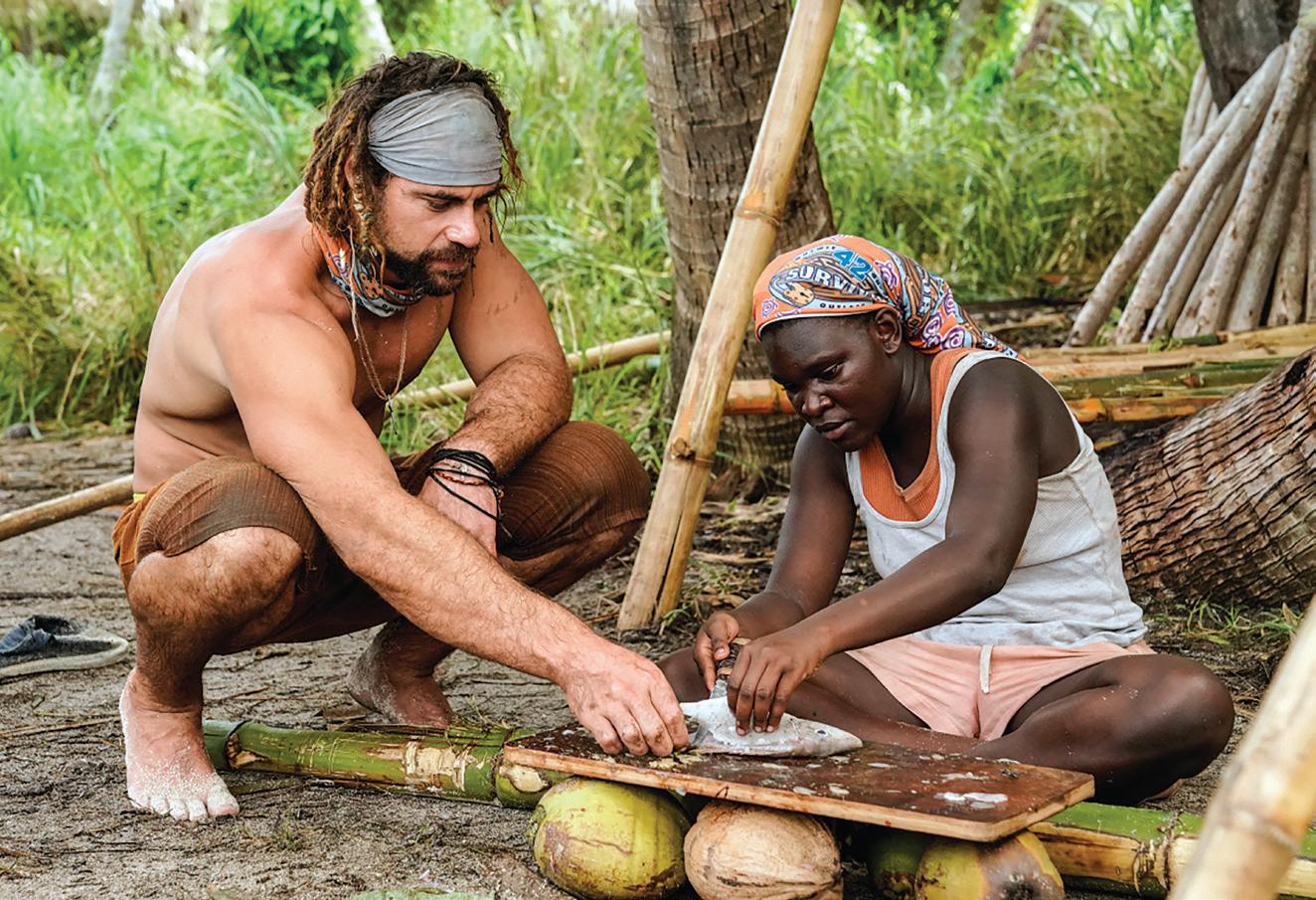
All Survivor watchers know that although the show’s surround-
ings are picturesque, life there is no beach. The sun is not always shining and the weather is not always balmy.
“I’m someone who hates being wet and cold,” she cried during her testimonial in episode 10. “When you can’t remember how it feels to be warm, your morale continually goes down. Having the rain just pouring down on us and not being able to start a fire, and all my clothes were drenched in the freezing cold, was one of the hardest days of my life.”
Despite the hardships, Maryanne never considered quitting.
“I constantly remembered that what makes the good things good are the lows that come with them,”
she says. “When it’s raining and all you want is to be dry, you just keep playing the game and then you can appreciate when you get a little warm again with your least-soggy clothes on. You need to have resilience because nothing quite happens as planned. Are you going to keep going or crumble to pressure?”
When asked how she tolerated all the creepy crawlies she shared the island with, she laughs again. “Your standards can drop so
quickly!” she insists. “Toward the end, I just said, ‘Huh,’ when a spider crawled right across my face. The only thing that really bothered me was when we burned a log with maggots in it. Disgusting!”
It wasn’t only the prize money that made the lows worthwhile. Maryanne has also appreciated connecting with many supporters on social media who can identify with her.

MARYANNE OKETCHCanadian Idol Survivor host Jeff Probst presents an immunity idol to Maryanne
“I have a very eclectic personality,” she comments. “Growing up, it was hard to find someone like me on the TV screen. But in my audition tape, I showed the producers that I could be my weird self and still perform on the show. Once I was on Survivor, I found many
Storming the Beach Survivor contestants including Maryanne perform a task.

“I never go down without a fight,” she says
people reaching out saying they really liked me!”
Maryanne credits her social interaction game and her mental game on the island as her strengths throughout the show, but she also had a spiritual weapon.
“I prayed a lot with fellow contes-

tant Tory Meehan,” she says. “My solid rock is my faith. The thing is, people sometimes question whether being cutthroat goes against our beliefs. But we were just playing the game. The true way I express my faith is how I treat people. Whether they feel they are above or below me, I would never demean anyone. Regardless, I treat everyone the same.”
After returning home to Toronto, Maryanne completed her master’s in seminary studies at Tyndale University. Prior to that, she had earned a degree in biochemistry at McMaster University in Hamilton, Ont.
“I was raised in a godly household and made the decision personally to become a Christian at the age of 10,” she says. “I had always felt called to ministry, so I went to seminary to see how my faith could impact my life. Right now, I’m working at my church and I assisted with vacation Bible camps over the summer. But I am also interested in public health and would like to make use of my biochemistry degree in the future.”
When asked what her first purchase as a millionaire was, Maryanne replied she gifted her parents a trip for their 30th anniversary late last year.

Her favourite Bible verse is Jeremiah 29:11: “ ‘For I know the plans I have for you,’ declares the Lord, ‘plans to prosper you and not to harm you, plans to give you hope and a future.’ ”
“I feel that’s a very good verse for me,” she says, “because whatever happens—good or bad—God has control. Knowing that gets you through all the lows.”
Originally airing May 31, 2000, Survivor is one of the longest-running reality series on TV. The show places a group of contestants in an isolated location, where they must provide their own food, fire and shelter. They compete in challenges that test their physical and mental abilities for rewards, and immunity from eviction. They are progressively eliminated from the game as they are voted out by their fellow contestants until only one remains and earns the grand prize of $1,000,000.

ACROSS THE ISLAND, THE SALVATION ARMY —LED BY POWERFUL WOMEN—MEETS PEOPLE AT THEIR POINT OF NEED.
by Kathy NguyenAfter two long years of not travelling due to COVID-19 restrictions, I was excited to go on the international development department’s annual Partners in Mission resource trip this past year to collect photos, videos and stories on the work being done in The Salvation Army’s Caribbean Territory. As media resource co-ordinator, I was part of the team that travelled to Jamaica, where the
Army has been meeting people at their point of need for more than 120 years.
Before arriving in the country, I remember watching sprinter Elaine Thompson-Herah, Jamaican native and Olympic winner (considered the fastest woman alive) at the 2021 Olympics when she received the Order of Distinction, an award given to Jamaican citizens who render outstanding service to the nation.
“I have been inspired and motivated by powerful women around the world,” she said. “Powerful women from my island home in Jamaica.”
Once we started visiting various ministries across the country, I was reminded of those words.
Around the world and in Jamaica, The Salvation Army is a strong advocate for equity and women in leadership, uplifting and amplifying the voices of women on every level—spiritually, physically and emotionally.
Here are three examples:
At the Pulpit “There’s a respect and love for The Salvation Army in this community,” says Major Pauline King
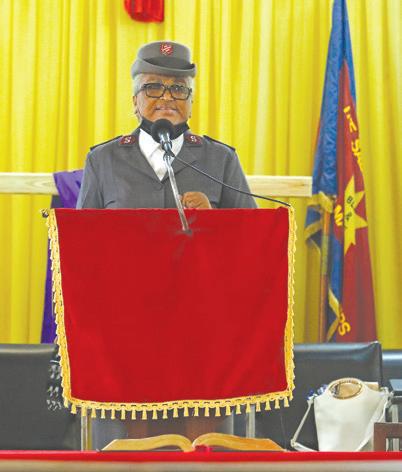
ated in the community. This can be attributed to many things, but one of them is the respect they have for the women who nurture and lead there.
One morning, Major Pauline walked into the church and realized it had been broken into. While she was on the way to the police station, an individual from a local gang discovered what happened and took matters into his own hands.
“Everything that was lost, from the bathroom tissue to the funds, were recovered,” she says.
“They know us. No matter what walk of life you come from, there’s a respect and love for The Salvation Army in this community,” she says. “With God’s help, we can continue to do another 135 years.”
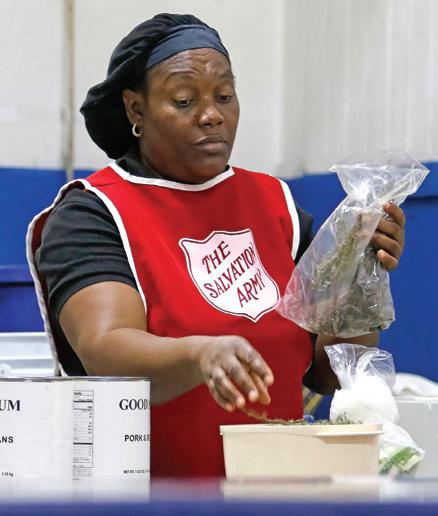
Soup’s On! “I find so much joy in my job,” says Claudette Heslop
Our first visit was to The Salvation Army’s Allman Town Corps, where Major Pauline King is the pastor.
“The biggest joy in this ministry is to see people come to know Jesus,” she says. “Many of our church live in the inner cities where there is dire poverty. We thank God that we’re able to be here.”
While the crime rates are high in Kingston, The Salvation Army is widely accepted and appreci-
Next, we went to The Salvation Army’s feeding centre, supervised by Claudette Heslop, that assists around 50 to 200 individuals a day.
Growing up in The Salvation Army herself, Claudette is passionate about the church’s mission to reach people in need.
“Once people receive their food, I sit down with them and find out how we can help them,” she told us. “When lunch is finished, we go out of our way to get them what they need, whether it’s a clean change of clothes, a bath or soap.”
Her hope is to grow the centre and expand its outreach.
“We need each other,” she says. “Nobody knows what tomorrow will bring, which is why I reach out with love and why I find so much joy in my job.”
At The Salvation Army’s School for the Blind and Visually Impaired, the only boarding school of its kind in the entire nation, Ruthlyn Bryan, the supervisor at the girls’ dormitories, ensures that everyone feels supported and cared for.
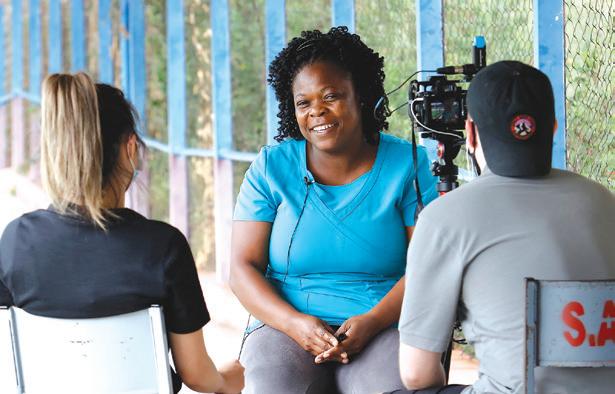
Also known as a “house parent,” she ensures the students are supported socially and emotionally.
From preparing their breakfasts to reading to them before bed, she is the parent or guardian a child deserves.
“Some of the parents don’t often have the chance to visit,” she says. “As a house parent, I’m here to fill that gap.”
And while watching the interactions between Ruthlyn and the students, it was evident that there is a mutual love and bond between them.
“There was one student who graduated and didn’t want to leave,” she recalls. “The bus was ready to take her, but she kept coming back to the dorm. She said, ‘Miss, you don’t know what you’ve done for me. If I had the choice, I wouldn’t leave.’ That’s when I knew I was making an impact.”
On our trip, we asked many people across Jamaica what their favourite Scripture verse was. And most of the people we spoke to would say the same thing: “I can do all things through Christ who strengthens me” (Philippians 4:13 New King James Version). It was clear that Christ is working across the Caribbean—and that the women who carry the Army shield are instrumental in carrying out His message with genuine compassion and commitment.
Individuals, students and communities across Jamaica can walk confidently and courageously into the future because of the powerful women who care. I am privileged to have met just some of them.
If you’d like to learn more about the Army’s ministry in Jamaica, visit salvationist.ca/PIM.
Recognizing that many integral biblical characters were men and women of colour is something to celebrate.
by Juanae CrockwellIt’s often said that Christianity is a “white man’s religion,” a reference to the way the Bible has been misused as a means of control and deception against people of colour.
It is no secret that white men have used the Bible for their personal gain or that colonizers wielded it like a weapon in warfare to steal land, people and resources. This part
of Christian history has often led to questions surrounding the authenticity of the faith, and if it is indeed a faith fit for people of colour.
When you actually stop and look at the Bible in its historical context, you will find that the origins of the Christian faith are far from white, although they may have been whitewashed over time.

But the fact remains that the history chronicled in the Bible, the history of Jewish, Muslim and Christian faiths, is indeed the history of men and women of colour. The history of Black people.
As the world turns its attention to Black History Month in February, it’s fitting to prompt a reflection on the “Blackness” of the Bible and the contribution it makes to Black history.
Let me be clear that the premise of this reflection is the belief that the Bible is a historically accurate book. With that being said, if you believe the Bible to be historically accurate, you will see that it broadly chronicles the origins of humanity.
Bible characters have been typically portrayed in popular culture as white and European, but I think we can all admit that this is not accurate. The history of African people is intertwined through the pages of the Old Testament and the New Testament, right from Genesis.
You probably won’t find the words “Black” or “African” in original translations of the Bible. Instead, you will read terms such as “Ethiopian,” “Cushite” and “Egyptian”—all of which are tribal terms that trace their ancestry back to the continent of Africa.
Representation matters, even— or perhaps especially—in religion
and it is important to acknowledge the presence of people of colour in Christian history: people like Zipporah, Moses’ wife, and Makeda, the queen of Sheba; Ham, the son of Noah, and his grandson, Nimrod, the first ruler recorded in the Scriptures; Hagar, Abraham’s mistress and the mother of his son, Ishmael.
And you can’t forget the two Simons. Simon the Zealot, one of Jesus’ 12 disciples who converted to Judaism by circumcision, and Simon of Cyrene, who infamously carried Jesus’ cross.
These are just a few figures in the Bible whose race and ethnicity are clearly defined as African. Others are more obscured as the Bible does not often go into detail on skin colour. But based on the geographical locations of key cities in the text, one could very easily assume that most of the Bible’s key figures are people of colour.
It is frequently said that the colour of our skin is immaterial to God, as He looks at the condition of our heart instead. While this may be true for a perfect being such as the Creator, imperfect humans are still deeply impacted by skin colour. Human nature is drawn to what is familiar. We resonate with and gravitate to what we identify as our own. Perhaps this is why the images of biblical figures have often been painted as white Europeans by white Europeans.
This reflection is not meant to be divisive. But recognizing that many integral biblical characters were men and women of colour is an important acknowledgment to make. An acknowledgment that still causes discomfort and reluctance because it challenges the world view that Christianity has often maintained.
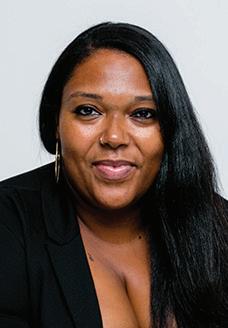
Uncovering, acknowledging and accepting the Black presence in the Bible can assist the religious community with addressing racism within the church and creating spaces to discuss issues of racial justice and equality.
It can also provide Black millennial believers a sense of belonging, something we truly look for in religious spaces because we struggle to find it elsewhere.
As we take time to intentionally reflect on the history of people of colour this month, let us be sure to include, emphasize and celebrate the roles of people of colour in the Bible and the foundation of the Christian faith.
The history of the Bible is indeed the history of Black people, and that is something all Christians can celebrate.
Reprinted from The Royal Gazette, February 7, 2022
“Representation matters, even—or perhaps especially—in religion and it is important to acknowledge the presence of people of colour in Christian history.” JUANAE CROCKWELL(left) Juanae Crockwell is the religious correspondent for The Royal Gazette in Hamilton, Bermuda.
TIME 35 min MAKES 2 servings SERVE WITH garden salad
Prawns
12 large frozen prawns with shell on 45 ml (3 tbsp) olive oil 15 ml (1 tbsp) lemon juice


Pinch of salt
1 garlic clove, diced Penne
180 g (6 oz.) penne 330 ml (11/3 cups) marinara sauce
60 ml (¼ cup) heavy cream 60 ml (¼ cup) grated Parmesan cheese
15 ml (1 tbsp) fresh parsley
1. Soak frozen prawns in water for 10 minutes and then drain.
2. Add 15 ml (1 tbsp) oil, lemon juice and a pinch of salt, and let sit for 5 minutes.
3. Heat a skillet over medium and add remaining oil and garlic.
4. Cook prawns over medium heat for 2 minutes on each side or until pink.
5. Boil water and add penne.
6. Heat marinara sauce over medium.
7. Add 45 ml (3 tbsp) Parmesan cheese, and whisk in cream while bringing to a boil. Continue whisking for 5 minutes and then remove from heat.
8. Drain pasta and toss in rosé sauce.
9. Garnish with remaining Parmesan and parsley, and top with prawns.
TIME 25 min MAKES 1 doz SERVE WITH tea or coffee
60 ml (¼ cup) butter 150 ml (2/3 cup) granulated sugar 5 ml (1 tsp) vanilla extract
1 egg 30 ml (2 tbsp) fresh lemon juice
375 ml (1½ cups) allpurpose flour zest of 2 lemons, approximately 2025 ml (4-5 tsp)
2.5 ml (½ tsp) baking soda
15 ml (1 tbsp) granulated sugar or sprinkles of choice
1. In large bowl using an electric mixer, cream butter, sugar and vanilla extract. Add egg and lemon juice and continue to beat until fluffy.
2. In another large bowl, mix flour, lemon zest and baking soda.
3. Stir in wet mixture to dry and mix well.
4. Grease baking pan or line with parchment paper. Preheat oven to 180 C (350 F). Spoon 15 ml (1 tbsp) of the dough and use the back of a fork to flatten cookies to about 5 mm (¼ in.) thick. Top with sugar or sprinkles of choice.
5. Bake for 12 minutes or until edges brown slightly and cookie is slightly firm to the touch. Transfer to cooling rack and allow to cool.



Step 1 Gather your materials. Compare your embroidery hoop to your choice of fabric to ensure you have enough material. Iron your fabric.

Jazz up your walls or windows using repurposed fabric and an embroidery hoop.



This DIY allows you to customize your walls or windows for special days such as Christmas or Valentine’s Day. It’s easy, fun and low cost. What’s more, you can easily score most of your supplies at your local Salvation Army thrift store. Perfect!
Supplies Needed: Fabric (e.g., scrap fabric, a thrifted blouse or even a scarf), embroidery hoop, scissors, iron, paintbrush or sponge brush, Mod Podge or white glue, ribbon or string. Optional: paint, Sharpies or decorative tape to add colour to the hoop; jewelry or buttons to add flair.
Step 2 Loosen the outer hoop to remove the inner hoop. Place the inner hoop underneath the fabric.
Step 3 Adjust the placement before adding the outer hoop. Add the outer hoop then start to tighten it. For this step, you can pull the fabric to remove any wrinkles and looseness.
2 1 3
Step 6 Next you can add a hanger for your art—this can be ribbon, string, jute, etc.
6
Step 4 After tightening the outer hoop, trim the fabric using scissors. Make sure you’re happy with the placement before cutting. Once the fabric is trimmed, there’s no going back.
5
Step 7 Now that you’ve completed the DIY, you can add some pizzazz. Or not. For two hoops, I left them as is. But on one, I used funky washi tape that worked well with the fabric. On the other hoops, I glued a heart to the top.
7
Step 5 Remove as much extra fabric as possible. Once you finish trimming the excess fabric, you can use a brush to add a coat of Mod Podge. This helps minimize any fraying of the fabric.
Other ideas for your DIY are to either paint or use a Sharpie to colour the hoop. Stitch on the fabric or use fabric glue to add either fabric or felt on top. Get out some second-hand jewelry or buttons for either the hoop or the fabric. The possibilities are endless!




(left) Denise Corcoran (aka Thrifty By Design) is an author, upcycler, community builder and workshop facilitator based in North Vancouver. She shares her enthusiasm for crafting and upcycling by facilitating “Crafternoons” throughout Vancouver. She is also a creative expert for The Salvation Army’s thrift stores. Find a thrift store near you at thriftstore.ca.
